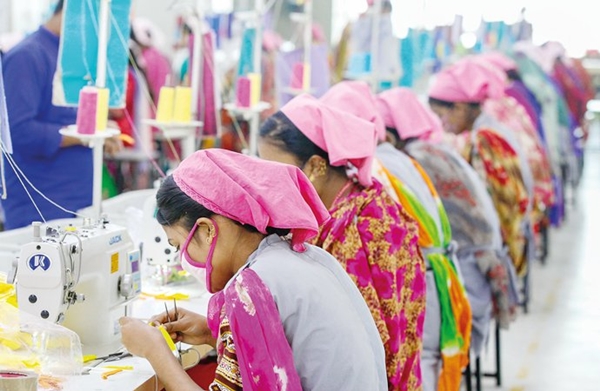Abu Taher Bappa
Published:2019-12-08 23:05:22 BdST
Automation to replace 60pc RMG jobs by 2041
FT ONLINE
As many as 60 percents of the jobs in the readymade garment (RMG) sector will become automated by 2041, which in effect will make nearly two out every five employees jobless in the industry.
Female employees with low education and workers in low-wage positions will be at a higher risk of losing their jobs because of automation.
The process will create additional employment opportunities for skilled workers in the emerging field. However, Bangladesh currently lags behind in producing workers with necessary skills such as computer-aided process planning and quality control.
This was revealed in a study by the a2i Project on five major industries, including the RMG sector, which was presented at a seminar organised by the Dhaka Chamber of Commerce & Industry (DCCI) at a Dhaka hotel on Saturday.
The seminar, titled "Future Skill Requirement for Bangladesh," was presided over by DCCI President Osama Taseer, while State Minister for Labour and Employment Begum Monnujan Sufian attended as the chief guest.
In a keynote speech, National Skills Development Authority's Member Mohammad Rezaul Karim showcased the necessity of skilled manpower in the five industries - RMG and textiles, agro-food, furniture, tourism and hospitality, and leather and foot-ware, because of the inevitability of automation.
The study says that automation will severely impact all five sectors of the country.
RMG & Textile
Automation will eliminate positions such as single and double-needle lockstitch sewing machine operators, floor supervisors, pattern makers, quality control personnel, production planners, fashion designers and portfolio developers.
However, new professions such as computer-aided process planners, computer-assisted quality control personnel, automated inspection, material handling device operators, artificial neural network experts, and fusing and pressing machine operators will emerge to replace the previous jobs.
Agro-food industry
In the agro-food sector, introduction of robotics will require the hiring of new employees with more technical skills. This will increase overall productivity but will leave many employees jobless.
Automation will impact positions deal with planting, identifying, sorting seedlings and harvesting crops. Drones and autonomous ground vehicles will replace agro extension service providers.
Butchers, sorters, mixers and quality controllers will also be replaced by machines. Robots will replace jobs in mass-scale food production.
In return, automation will produce jobs such as big data analysts, drone operators, and large sorting and planting machine operators.
Furniture industry
Robots will remove the positions of traditional workers, helpers, and supervisors in the furniture industry.
However, new positions such as 3D printing and additive furniture manufacturing professionals, computer-aided designers and professionals responsible for augmented reality and intelligent tools for design and fabrication will emerge.
Tourism & Hospitality
Automation will threaten positions in front office management, housekeeping, sales and marketing, and revenue management.
Meanwhile, new professions such as voice-activated device managers, chat bot and travel bot operators, Wi-Fi connectivity managers, networkers and internet security designers will provide additional employment opportunities.
Leather & Footwear
Automation will remove jobs in leather cutting and sewing by hand, embossing and stamping operations, footwear finishing, leather trimming and performing drying operations.
Emerging new occupations will be digital sewing machine operators, skiving operators, leather trimming operators, 3D printing and developing machine operators.
At the event, DCCI President Osama Taseer said, "The present education system in Bangladesh is not equipped to train people with skills in such areas. We don't even have an education system that is capable of producing the present requirement of skilled manpower in our industries.
"Because of this, many highly skilled foreigners are working in our industries for hefty salaries. We are spending a lot of money on them."
Taseer added that many Bangladeshis working abroad are not very skilled either.
Meanwhile, Md Nojibur Rahman, principal secretary of the Prime Minister's Office said, "Development of skilled manpower is not a destination, but a journey. Bangladesh is already on this journey under the leadership of Sheikh Hasina.
"The National Skills Development Authority is trying to achieve this goal. However, the government cannot do it alone. We need good collaboration among academia, the private sector and the government."
State Minister for Labour and Employment Begum Monnujan Sufian said, "Within the next 10-20 years, capital-intensive industries will replace labor-intensive ones.
"The government is aware of the impending job loss because of automation, and it is trying to equip the next generation with the necessary skills to find employment."
Bangladesh Employers Federation President Kamran T Rahman, Bangladesh Garment Manufacturers and Exporters Association Senior Vice-President Faisal Samad, Bangladesh Small and Cottage Industries Corporation Chairman Mostaque Hasan were also present at the event among many others.
Unauthorized use or reproduction of The Finance Today content for commercial purposes is strictly prohibited.


